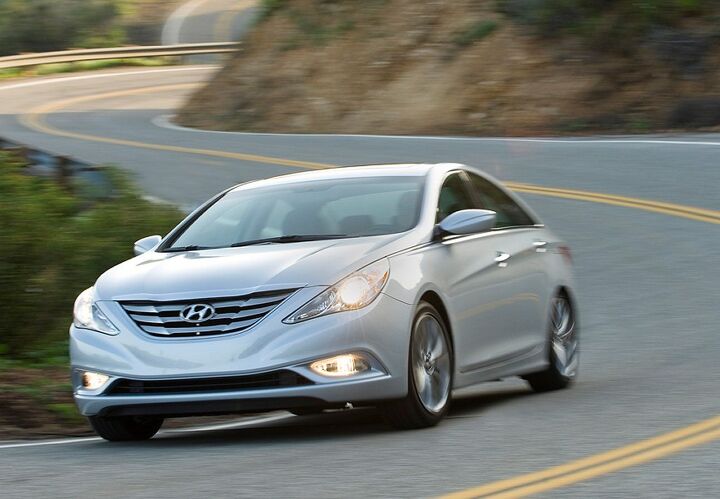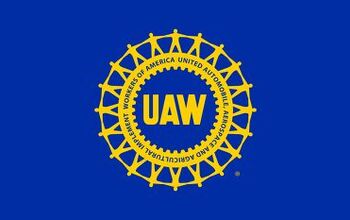Hyundai Sonata Turbo And The Economics Of Added Horsepower
For some people (you know who you are), the 200 horsepower provided by the 2011 Hyundai Sonata’s 2.4-liter four-cylinder base engine just isn’t enough. The traditional solution: a V6. But Hyundai, taking a page from Chrysler’s Iacocca-era playbook, has opted to offer a turbocharged 2.0-liter four instead. The specs look good: 274 horsepower at 6,000 rpm and 269 pound-feet of torque from 1,750 rpm. The pricing? Even better. The Hyundai Sonata SE 2.0T lists for $24,865, only $1,550 more than the regular Sonata SE. Are these the cheapest horses new car money can buy in a midsize sedan?
I ran the lot of them through TrueDelta’s car price comparison tool. This made it easy to similarly configure each car with both available engines and then adjust for remaining feature differences. Uplevel engines often come with features that aren’t offered with the base engine. In the case of the Sonata SE, the 2.0T adds dual zone climate control. The tool doesn’t adjust for wheel size, so I’ve added a $250 adjustment here (noted with an *).
* includes $250 adjustment for one-inch difference in wheel diameter
A trimmed mean was calculated after excluding the outliers (Altima, Impala). The average price per horsepower: about $24.
A couple of GM sedans occupy the top end of the range. In both cases the cost of the optional engine isn’t out of line. Instead, the engine simply doesn’t provide much additional output. Buick might want to reconsider tuning the Regal’s turbocharged four for only 220 horsepower, given the much more powerful mills offered by Hyundai and most others. The Impala? Offering only 19 additional horsepower with the uplevel engine is just one of many ways it’s well past its sell-by date. Even BMW (5-Series included for comparison purposes) charges less power horsepower.
The Ford Taurus, also near the top of the range, is a unique case, since its base engine is about as powerful as the other cars’ uplevel engines. It simply costs more to go from 265 to 365 horsepower than from 165 to 265. In this case, you’re paying for not one but two turbos. These turbos could be providing more power, but the transaxle’s life would be endangered.
Subaru’s excuse? Unclear. They haven’t historically sold many flat sixes, and aren’t a large manufacturer, so lacking the others’ economies of scale their cost for each H6 is likely far higher. They used to charge even more for them.
Though not far from the average, Mazda and Toyota nevertheless charge about a grand more for a V6 than Buick, Honda, and Ford.
While the Hyundai Sonata 2.0T is within the low end of the range, it’s not quite the lowest. That honor goes to the Nissan Altima, by a substantial margin. Even without adjusting for feature differences the Altima would still lead the field. They’re charging fewer dollars per horsepower than anyone else AND tossing in plus-one alloys. So, if you’ve been wanting a VQ…
The Volkswagen CC is an odd case. Last year the VR6 cost thousands more—but could be purchased with fewer features. This year many features are no longer available on the 2.0T turbocharged four-cylinder, but everything is standard with the VR6. Hence the huge price adjustment—which only includes $100 for the VR6’s 600-watt Dynaudio sound system (for its surround sound feature). Essentially, if you’re ready, willing, and able to drop forty-large on a VW, they’re willing to charge only $16 per horsepower for the VR6. Even less, depending on how much the Dynaudio system is worth to you. On the other hand, if you don’t want to pay for all of the stuff, then no VR6 for you.
The LaCrosse is next. Buick has been touting the fuel economy benefits of equipping these heavy sedans with a direct-injected four-cylinder. But their pricing suggests that they’d rather sell you the much more brand-consistent V6. Bonus: it’s a 3.6-liter in all trim levels for 2011. The underwhelming 3.0-liter has been dropped.
Hyundai’s charging only pennies more for each extra horsepower than Buick. Seems they’re as eager to sell turbocharged engines as Buick is to not sell four-cylinders. The Sonata’s bonus: the new turbo four runs on regular unleaded (some of the others require premium), and with EPA ratings of 22/33 is nearly as fuel efficient as the base engine. Next closest: the Accord’s 20/30. Not in the ballpark: the Chevrolet Malibu’s 17/26.
So, what’s not to love? As with nearly every other car in the class, the Hyundai Sonata’s uplevel engine won’t be offered with a manual. Shift paddles will have to do. The unexpected exception: Buick’s Regal.
Michael Karesh lives in West Bloomfield, Michigan, with his wife and three children. In 2003 he received a Ph.D. from the University of Chicago. While in Chicago he worked at the National Opinion Research Center, a leader in the field of survey research. For his doctoral thesis, he spent a year-and-a-half inside an automaker studying how and how well it understood consumers when developing new products. While pursuing the degree he taught consumer behavior and product development at Oakland University. Since 1999, he has contributed auto reviews to Epinions, where he is currently one of two people in charge of the autos section. Since earning the degree he has continued to care for his children (school, gymnastics, tae-kwan-do...) and write reviews for Epinions and, more recently, The Truth About Cars while developing TrueDelta, a vehicle reliability and price comparison site.
More by Michael Karesh
Latest Car Reviews
Read moreLatest Product Reviews
Read moreRecent Comments
- Honda1 Unions were needed back in the early days, not needed know. There are plenty of rules and regulations and government agencies that keep companies in line. It's just a money grad and nothing more. Fain is a punk!
- 1995 SC If the necessary number of employees vote to unionize then yes, they should be unionized. That's how it works.
- Sobhuza Trooper That Dave Thomas fella sounds like the kind of twit who is oh-so-quick to tell us how easy and fun the bus is for any and all of your personal transportation needs. The time to get to and from the bus stop is never a concern. The time waiting for the bus is never a concern. The time waiting for a connection (if there is one) is never a concern. The weather is never a concern. Whatever you might be carrying or intend to purchase is never a concern. Nope, Boo Cars! Yeah Buses! Buses rule!Needless to say, these twits don't actual take the damn bus.
- MaintenanceCosts Nobody here seems to acknowledge that there are multiple use cases for cars.Some people spend all their time driving all over the country and need every mile and minute of time savings. ICE cars are better for them right now.Some people only drive locally and fly when they travel. For them, there's probably a range number that works, and they don't really need more. For the uses for which we use our EV, that would be around 150 miles. The other thing about a low range requirement is it can make 120V charging viable. If you don't drive more than an average of about 40 miles/day, you can probably get enough electrons through a wall outlet. We spent over two years charging our Bolt only through 120V, while our house was getting rebuilt, and never had an issue.Those are extremes. There are all sorts of use cases in between, which probably represent the majority of drivers. For some users, what's needed is more range. But I think for most users, what's needed is better charging. Retrofit apartment garages like Tim's with 240V outlets at every spot. Install more L3 chargers in supermarket parking lots and alongside gas stations. Make chargers that work like Tesla Superchargers as ubiquitous as gas stations, and EV charging will not be an issue for most users.
- MaintenanceCosts I don't have an opinion on whether any one plant unionizing is the right answer, but the employees sure need to have the right to organize. Unions or the credible threat of unionization are the only thing, history has proven, that can keep employers honest. Without it, we've seen over and over, the employers have complete power over the workers and feel free to exploit the workers however they see fit. (And don't tell me "oh, the workers can just leave" - in an oligopolistic industry, working conditions quickly converge, and there's not another employer right around the corner.)































Comments
Join the conversation
Turbo's,intercoolers,direct injection and soon exhaust recirculation is going to soon be the norm.I predict Ford will drop the twin turbo on their V6 and go with a little bigger adjustable nozzle or twin spool turbo. You can be sure that GM and Ford have each bought a Sonata to tear down to see how they made a safe car without a lot of weight. GM in particular has to put all their mid size cars on a diet to get their lb/hp ratio down.In about 15 to 18 months from now GM will have some real nice product out their with new 4 and V6 engines.The anemic 3.0L V6 will be much improved...a lot of product people at Buick & Cadillac, in particular were pissed off at having to put that little weak effort into their line up.
I know this is an old article, and it is about "added" power. However, I think there are two other factors that compare the economics of horsepower better. I think we should look at the MSRP/hp too determine the overall cost of hp. While this factor probably has a lot of variability because of options on the car, this can be done on a high-horsepower, base level optioned car from each manufacturer. I think we should look at Annual fuel cost/hp both for highway and city driving. In the end, I would think that the sonata would very high all your comparisons. FYI-as my name implies, I own a 2012 Sonata 2.0T, and I've owned a Sonata since 2004. I've had very little problems with both cars, and when I did have a problem, I had no problem with it getting covered under the 100,000 mile warranty, which leads to my last point of economics. Since the Sonata comes with 100,000 mile warranty, the cost of maintenance is probably lower than the average car, but I have no real numbers to compare, just my 8 years of experience of owning the car.